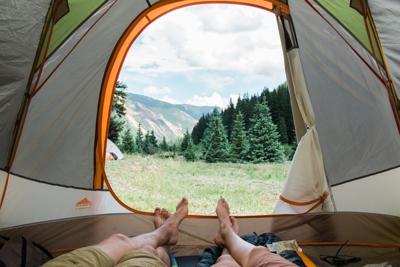Presented by:

One of the pleasures of living in or visiting Colorado is the ability to enjoy the great outdoors. Camping allows you to really get out there experience natural scenery in a variety of landscapes from desert plains to high mountain meadows. These are just a few things you should know before you go camping in Colorado.
1. Rules of the Land
Before setting out on your camping or backpacking trip you should take the time and learn the rules. Rules vary from one area to another and there are plenty of good websites to check out to see what rules apply to the area you are camping. Websites to check for rules include the National Park Service, the Bureau of Land Management, National Forest Service, State and local governments such as Colorado Parks and Wildlife. These websites will have a plethora of information on the rules you asked to follow.
2. Where to Camp
Colorado is a special place for people who like to camp and experience the outdoors. Almost 70% of Colorado forests are held by some type of government agency such as U.S. National Forest Service; Bureau of Land Management; National Park Service; Colorado Parks and Wildlife as well as local agencies such as Boulder County. While camping in Colorado, you have the pleasure of deciding what type of experience you want from urban to wilderness to an established campsite next to a reservoir. Remember to never camp on private land without the landowner’s prior permission.
Those who know, go prepared. Click here for gear to get you out there!
3. Gear You’ll Need
When you go camping there are a few special items that you should take along with you. Special items can include a first aid kit, water purifying system, a fire making source, adequate clothing depending on the season, a quality flashlight, appropriate shoes (hiking boots or trail shoes), navigation equipment (compass and maps, a GPS system or both) as well as a Colorado Outdoor Recreation Search and Rescue (COSAR) card.
4. It’s not easy to boil water at altitude
Colorado has an average altitude of 6,800 feet above sea level. If you do not have an adequate water purification system, then you will need to boil water before you consume. Whether you are camping on the Eastern Plains or in a high mountain meadow, you need to boil water at higher temperatures due to the altitude in order to kill all existing bacteria and fungi before drinking.
Why camp when you can ‘glamp’? Click here to find gear for your next adventure!
5. Protect the Wilderness, Leave No Trace
Whether you decide to camp in a wilderness area, established campground, or within a national park, you should always camp with a Leave No Trace attitude. These seven principles are simple for you to follow and will ensure that the natural area maintains its original environment. These principles will increase your awareness to the problem of overuse in sensitive and non-sensitive areas.
6. Do Your Research Before Bringing Your Pup
Pets are not always welcomed in every place you might want to camp. When you do take your pet, you should always follow the rules such as a six foot leash, cleaning up after your pet, and making sure that other surrounding campers are not harmed. Following the rules of each area will greatly enhance your opportunity to enjoy camping with your best friend.







(0) comments
Welcome to the discussion.
Log In
Keep it Clean. Please avoid obscene, vulgar, lewd, racist or sexually-oriented language.
PLEASE TURN OFF YOUR CAPS LOCK.
Don't Threaten. Threats of harming another person will not be tolerated.
Be Truthful. Don't knowingly lie about anyone or anything.
Be Nice. No racism, sexism or any sort of -ism that is degrading to another person.
Be Proactive. Use the 'Report' link on each comment to let us know of abusive posts.
Share with Us. We'd love to hear eyewitness accounts, the history behind an article.